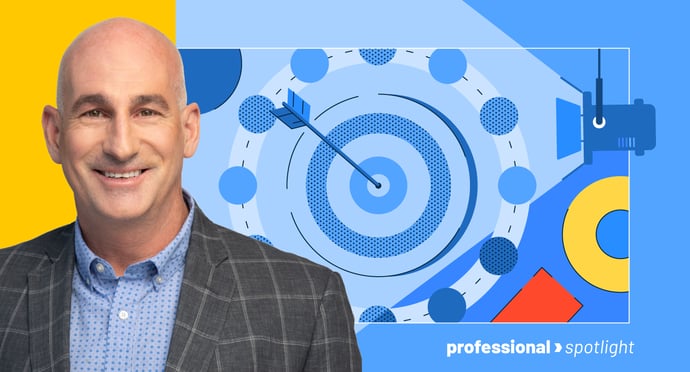December 6, 2023
 by Washija Kazim / December 6, 2023
by Washija Kazim / December 6, 2023

Building extraordinary is a continuous process that requires commitment and a clear vision. Leaders must focus on fostering a culture of excellence, empowerment, and transparency to create alignment with the company's goals.
If you’re on this journey to excellence with your team, there’s no better way to succeed than to learn from seasoned experts. I had the best time chatting with Casey Carey, CMO of Quantive, where he shared his process for building connected and high-performing marketing teams, developing leadership skills, and managing misalignment within groups.
This interview is part of G2’s Professional Spotlight series. For more content like this, subscribe to G2 Tea, a newsletter with SaaS-y news and entertainment.
What's your favorite beverage, and when do you enjoy it? It's called a coin-style margarita. And it's basically Silver Tequila Cuatro, fresh lime juice, and a splash of agave syrup. It's very simple and easy to make. I enjoy it when I'm eating street tacos, which is one of my favorite things to do.
What was your first job? My dad managed retail stores when I was growing up, so I was a stock boy. I would unload semi-trucks, stock shelves, and change out end caps when the seasons changed. I did a lot of pricing and inventory, too.
What's your favorite software in your current tech stack? I'm a big fan of 6sense. Most of our marketing strategy is built on it, using customer scoring and predictive models for the buying stage and activating that data through marketing channels. But ChatGPT is quickly becoming a favorite across the team.
What problems at work make you want to throw your laptop out the window? I'm glad you asked this question. I have four triggers. I know I have them, but I still struggle with them:
Whenever I get one of those questions or comments, it's really hard to contain myself.
Washija Kazim: Let's begin by revisiting your professional journey. Can you provide an overview of how you got into marketing and arrived at your current role as Quantive’s CMO?
Casey Carey: My undergrad is in electrical engineering. Out of college, I designed hardware and wrote software for defense systems. My claim to fame is that I worked on the flight computer for the Peacekeeper missile and some other interesting defense platforms.
I quickly learned that writing code every day was boring and that I really liked the big-picture stuff. When I look back now, I can narrow it down to probably six major career pivots. I got more into program and project management, and then I went to work at a startup and got into product management because I knew I had a technical degree. But because I liked the big-picture stuff, I eventually moved into product marketing and ultimately evolved to a CMO role.
According to my engineer friends, I've totally gone to the dark side. But it was natural for me because I love data and science. I love the behavioral and psychological aspects of marketing. I love the creative component, and I love the strategic component. Ultimately, being a CMO allowed me to have everything I like in a single role. And if you'd asked me that 20 years ago, I would have never guessed or said that.
Were there any specific experiences or milestones that defined your journey toward a marketing career?
Yeah, absolutely. In the mid-nineties, I worked for Customer Insight Company. They were the first to put a marketing database on a desktop computer. Before that, they were in mainframes and micros. It was a luxury to have a marketing database – you had to be a big bank or a big company to do that. That was when I realized there's a science behind marketing.
It was in that role where I thought to myself, ”I like marketing!” Before that, I would have told you marketing was all fluff. That it was parties, martinis, and golf events, a waste of time and money. But I got exposed to the power of marketing and realized it was cool.
And then, ultimately, I had a 4.5-year stint at Google, which did a couple of things, too. I got a chance to see what ‘great’ looked like, not only for Google as a company but also for Google's customers. They work with the top marketers and advertisers in the world, giving them great exposure to top brands. This influences how they think about their business and the role that marketing plays in what they do. For me, that experience really up-leveled my understanding of marketing and the power it has.
There’s a scientific part of marketing that involves data and modeling. And there’s a creative part that taps into psychology and strategy. It's the fusion of both that drives effective outcomes.
Casey Carey
CMO, Quantive
I’d like to shift gears a little bit here and delve into your role as a leader and how it has evolved. How would you describe your leadership style? Are there any critical qualities a CMO should possess to lead successfully?
I could talk about this for hours. Early in my career, my leadership experience was mostly with start-ups and high-growth tech companies. For such businesses, the predominant leadership is about getting stuff done. You're always running hard, and you’ve got a lot to do. It's a great environment because you learn how to thrive in ambiguity.
You learn that there's a real sense of urgency. You learn to make the best of a small number of resources that you have. There's always that unanimity of purpose like we're all here for a single cause, and we're all together. Collaboration is easy, and motivation and excitement are all built-in. That’s what influenced my leadership style early on.
And then, I went to Google and quickly realized that the number one job of a leader is people. It's not getting stuff done. It's about taking care of your people. And if you invest your time and effort in your people, stuff will get done. This shift in perspective changed my mindset and approach.
As a leader, you’ve got to start every day with the same thought: your number one job is the people.
Casey Carey
CMO, Quantive
At one point, Google got rid of all their managers, thinking they were wasting resources. But they quickly realized it was a mistake. They changed their course and asked, “What are the common attributes of the most successful Googlers?”
After a bunch of research and data analysis, they discovered it’s the managers. By investing in the management teams and growing their skill sets, they raise the entire company's performance.
They created a framework called the Oxygen Attributes – ten attributes of a good leader. Half the attributes are about your people and the other half are about getting the job done.
These attributes shift your focus to hiring great people, giving them clear objectives, and setting them up to be the most successful they can be in that process. This experience was a very important inflection point for me in my career. And that’s what I bring to the table now as part of how I lead my teams.

Keep up with what’s really going down in marketing with the G2 Tea newsletter. Subscribe here
I’m curious to know what fostered your interest in building connected and high-performing marketing teams. One of the things you mentioned about working at Google was that the company’s culture changed your perspective on what leadership is about. But was there anything else that sparked that initial interest?
Yeah, there are some aspects to it. People call it culture, and they call it values. I like to think of it as a mindset. It has three main components: the mindset, how you guide the team, and how you operate it. So if we think about mindsets, it speaks to who you hire, who you promote, and who you fire. I come to the table with a mindset that I embraced, and it's going to become part of all my interactions.
Leadership is where I set the expectations, but I expect my team to be as bought-in and contribute to those mindsets as much as I am. I'll give you a couple of examples.
The first mindset is focus. We have a mantra on my team that we only do the things that align with our strategy and will have the most significant impact. Everything else is a no. And that's a hard mindset to apply, especially outside the marketing team where you have to say “no” or “what if?” to our stakeholders and sales and product teams. But we know that if we are focused on the most impactful things, we will be successful.
Many marketing teams are focused on effort and activity. They commit to a thousand things and then wonder why people are frustrated. So the second mindset is shifting the outcomes. We're focused on creating impact and outcomes. It's not about activity. Don't tell me about all the things you did. Tell me what you made happen, and show me the tangible results you achieved.
The third is transparency. This is my expectation for my team. Everyone on the team knows the state of marketing. They know what our metrics are, whether we're on target or behind, what our priorities are, and they also understand the state of the business.
It's not, “Hey, I'm running email nurture campaigns. I can tell you what our click-through rates are” No, you should be able to tell me what our new logo win rate is. It’s crucial not only to make such information available but also to make it essential for everyone to know.
The fourth is empowerment. There's a meme on charts about how big companies work, and Google's just a mess of network lines. But that's actually how Google works. There's no hierarchy.
[Quantive] just works across functions and across each other to get things done. My team thinks I'm half kidding when I say that I'm just a member of the team. We’re all working on the same goals and outcomes together.
Yes, we have reporting, but that's for administrative purposes. It's not for operational purposes. Everybody has a seat at the table. Everybody has a voice. We'll make decisions together, and we're all working toward a common outcome.
The last mindset is learning. Hiring managers often prefer people who know the answer to every question but forget to seek consistent learners. Think to yourself, even if an employee has all the answers, could we get to a better solution if other people were involved in the conversation?
It’s not about hiring know-it-alls but rather the learn-it-alls. Get the people who know they don’t have all the answers.
Casey Carey
CMO, Quantive
There's always an opportunity for improvement. We're all a draft version of ourselves, and we're constantly working on the next draft, making it a little bit better all the time.
I loved how you put it: learn-it-alls. Is that what "high-performing" means to you? Is it an adaptation of this mindset?
Yeah, if you're doing well on all those mindsets, then you set the foundation for performance. You still have to deliver, but it all starts with a strategy and a vision. For example, I outline a strategy that we update every quarter. Everybody in my team should know the top 3 to 5 things we're focused on, why we're doing it, and how we will measure its success.
After that clarity, every bit of work we do, every calorie we burn, and every second of the day should be aligned with those 3 to 5 things. If not, we should have a conversation; either we need to change the 3 to 5 things, or we should stop doing that work. It's about having that level of focus and turning strategy into an action, a framework, or an approach.
We use objectives and key results (OKRs). Our objectives generally are multi-quarter objectives. Like building a solid brand – that’s not going to happen in a quarter. But within that quarter, we've got specific initiatives and outcomes that we're seeking to achieve. And if we do that continuously over time, we'll build a firm ground.
It’s crucial to look at those objectives and constantly assess progress. We review our metrics and OKRs every Monday morning. We have conversations about making course adjustments, identifying what's working and what's not, and doing things differently. It’s a mindset of celebrating on Mondays and Fridays. We do that weekly, and that’s how we operate the team.
And then the last part is just around velocity. It's too easy to say, “Oh, I don't know the answer to that question,” or “I'll wait till next Monday when I have a chance to talk to someone about it.” The more you do that, the more you waste time, week after week.
It’s the idea of creating a cadence of accountability, a cadence of review, and quick decision-making. You're never going to know all the answers, but let's get what we need or have, let's make a decision and move forward. We need to be more forward-looking than backward-looking.
One of my goals in my career is to kill quarterly business reviews. The idea is that if everybody knows what you should be doing and they know the current state of the business, why would you ever stop and review the state of the business?
Instead, why wouldn't you stop and talk about what challenges you have, what opportunities are in front of you, and what you're going to do next? I have yet to get there, but one of my missions in life is to stop having quarterly business reviews.
You know the people working for you right now, but what does your process look like when it comes to hiring people and expanding that high-performing marketing team? What characteristics or skills do you look for? I caught some skills you mentioned, like having a learner mindset. How do you judge these things?
That's a great question. Because, ultimately, it's all about talent. Leadership is much easier if you hire the right talent. If you have a vision for what the right talent is, then you can change, like I said before, who you hire, promote, and fire.
I'm a big fan of diversity of opinion and diversity of perspectives. We sometimes fall into the trap of hiring people who worked in the same companies, went to the same schools, hung out in the same circles, or had the same experiences because it's comfortable.
The key is to bring in different perspectives consciously. For instance, a B2B company can think of hiring someone from B2C simply because they’ll bring different perspectives and experiences. Sometimes, you'll hire a specialist for a role, and there's nothing crazy about it.
But generally, marketing organizations should focus on building more flexibility. Take a chance on different kinds of talents and perspectives that give you more flexibility over time.
Companies are always testing whether or not a candidate can do the job. But the focus should be, ‘Is this the right person for the job? Are they additive to our culture, or would they be dilutive?’ And if the answer is the latter, you should never hire them.
Casey Carey
CMO, Quantive
I always look for cultural add. They could have the best skills and experience in the world, but it's not worth diluting your culture to bring that in. You can find it elsewhere. It's not about, "Hey, is this somebody I'd want to go have a margarita with after work?" It's somebody who makes the team better. It can be simple things like they say please and thank you. Or it could be that they are willing to help somebody even though they're not asked to.
You can get a sense of these things through behavioral questions during interviewing. You can find out how people are wired through the interview process and ask them some real life questions. That's a big part of it.
And lastly, it’s about leading without authority. When I first take on a team, my expectation is that they have a desire to lead. Every meeting you're in, every project you work on, every interaction, every Slack or email you send, you have an opportunity to lead.
Leadership is not about people reporting to you. Leadership is about having a voice, expressing your opinion, holding people accountable, and showing what it looks like on a consistent basis.
Casey Carey
CMO, Quantive
If I went over to sales and said, "What do you think about Stephanie?" If they say, "She's fantastic! She is excellent at her job,” then she's leading. And that's the response you want because she's adding value to each one of those interactions. She's not an order taker, transactional, or hard to work with. Everybody has a great experience when they work with her. And that's what I'm looking for from my team.
So it's about hiring someone who shows potential over hiring someone who's qualified but without anything to add to your culture.
Yeah, that’s very accurate. Often, we go through order changes where we'll be like, “Oh, we need to focus more on this. Who on our team has done that before?”. But sometimes you want to challenge yourself and say, “Who on the team could learn that?” And give them that opportunity.
Can you walk me through some of the biggest challenges you faced when building a marketing team? Are there any specific lessons that you can share?
I definitely recommend using behavioral questions to figure out how people are wired and what their experiences have been and to push them on it. Most people will give you the correct answer initially. But when you push down, you'll get more clarity.
Everybody knows the right answer to all the top-level questions. It's the third or fourth-level question where people are themselves, and you hear the absolute truth.
Casey Carey
CMO, Quantive
We'll all make hiring mistakes. It's just a part of it. I've never let someone go too soon. I've never said, "Damn, I shouldn't have let them go because they were awesome." Instead, every time, I find myself thinking, "I should have done that sooner." And you want to give people the benefit of the doubt, you want to coach them, you want to try to work through it. All that stuff is essential, but you also know that it's not going to work. The sooner and the faster you move, the better off.
Because it goes back to [whether] they are diluting or adding to your culture. That's the core question. If you can't get them to a place where they're additive to your culture, then it's a net negative. We tend to feel, "If I let that person go, who will do that work? We'll fall behind." And all those reasons not to let somebody go.
Yes, there will be short-term pain, but your team is looking for your leadership. They're not dumb. They know, and they're sitting there saying, "Why aren't you doing something about this?" So the faster you act and the more conviction you have, the better off you will be in the long term.
Yeah, that makes a lot of sense. Another challenge that came to my mind earlier was about prioritizing high performance while discouraging burnout. How do you make that happen?
It's interesting because, many times, we believe high performance equates to burnout. And if you think about it correctly, the opposite is true. Burnout usually comes from doing a lot of stuff without any achievement or expected outcomes. There's no purpose. You do too much work, but you don't feel satisfied or fulfilled, resulting in burnout.
If you think about performances being driven by doing a few things that have the biggest impact, things aligned with a bigger strategy and purpose, you're empowered to decide how you do that work and what you can say no to. And then you can manage that workload.
At the end of the day, performance and burnout aren't synonymous. If you have a high-performing team, it feels great. People are much more fulfilled and motivated by their work than ever. Burnout mainly occurs in the most dysfunctional groups for all those reasons.
That's the trap we fall into. We think high performance is just doing a lot of work. It's not about effort and activity. Performance is not those things. And if that's your path to high performance, you're probably doing it wrong.
Casey Carey
CMO, Quantive
It's about clarity of purpose and clear expectations. We all want to be held accountable. It's about being connected. We're all working on the same things, and we have a common purpose, and we're in this together. It's about having opportunities to develop skills and learn new things.
If you can create an operating environment, a culture that meets the team's needs, then you're going to get much better coming out the other side. It will result in your team loving and enjoying what they do instead of going down this path of, “I hate my job,” or “I’m burned out,” or any of those things.
I'm with you on that. Let’s think about the marketing leaders struggling with dysfunction or misalignment on their team. What advice would you give them? What steps should they take to remedy the situation?
Misalignment occurs within the marketing team and then outside the marketing team. I see this a lot when I hear comments like “We don't have role clarity,” which usually is a euphemism for another issue if you push down on it or “We're too siloed.” Those are my two favorite phrases. When I hear either of those two things, I’m ready to dig in.
A part of it is if you're on a marketing team, whether five people or 50, no one on the team should ever say we're too siloed. No one should ever say, “I don't have role clarity.” Those words should not exist. As leaders, we've got to be very attuned to those situations and make sure we're resolving them.
And the funny thing about role clarity is that people are always afraid somebody else is doing their job for them. There's always more than enough work, so I don't know why they're worried about somebody else doing the work they may have, could have, or should have done.
You have to go through that process, and it goes back to just being a single team, a team of individual contributors working towards a common goal versus a bunch of individual contributors working for individual goals. So it's about creating those expectations.
Externally, whether you're a marketing leader or CMO, you own that. And one of the traps I've seen marketing leaders fall into is the mentality that marketing is awesome, but sales sucks. Leaders perpetuate that point of view within their teams. I never do that. I would never tolerate my leaders or my team members thinking that way or talking that way.
We're never awesome. We're always going to be better. Our partners in sales and product or customer success (CS) are in the same boat. They're good at some stuff, and they have some things they can improve on.
We could do the best marketing in the world. We could win awards. We could do all kinds of amazing things. But if nobody buys anything or customers don't stay customers and [keep] using our products, it actually doesn't matter. Marketing should always work to make the sales, product, and CS team more successful. That should be why we do what we do.
And if you have that mindset, then you can make some progress on any misalignments or things like that cross-functionally.
I love that approach to tackling misalignment. Is there a way for marketing leaders to tell that they've accomplished building a high-performing team? What is the next goal for them?
There's always the metrics. There are instances where you meet your metrics or exceed them. That's great. But there will also be times when you won't hit your numbers, and you're still high-performing. You should be able to admit that for other reasons.
My goal is that if I were to ask anyone in the company what they think about marketing, they should say marketing kicks ass. It should reflect how we interact, the quality and quantity of our work, the outcomes, the impact we deliver, and the general perception of marketing.
I want to be the best-run team in the company. In fact, I want to be the best-run marketing team in our category. We may not have the same number of dollars or the same number of people as somebody else in our category, but we can be the best team. They may be able to outspend us, but we're a better marketing team.
We all have the same tech stacks, access to the same data, run paid search and social campaigns, do events, and run the same playbooks. As a marketing leader, the one thing that you can do differently is be a better marketing team.
Casey Carey
CMO, Quantive
You can have better talent, you can have better values, you can have better mindsets, and you can deliver better results. That's the one thing you can do as a marketing leader that gives you an advantage.
To your question of what's next? There's always more, honestly. If you're super focused on the most impactful stuff, you already have a list of the next stuff by definition.
“So we’ve mastered account-based marketing. Great! What are we doing about customer cross-selling? Or what's our partner strategy? What if we want to move into new markets?”
There's always plenty to take on and continue to grow and expand. Marketing is never “set it, forget it.” It's a continuous game of sense and response.
Casey Carey
CMO, Quantive
This has been incredibly insightful, Casey. I would love to close with some takeaways for our readers. Do you have any parting words or advice to give to marketing leaders trying to set up high-performing teams?
My one piece of advice is to be a strategic driver of the business at all costs. It's tough, but ultimately, that's why you're here. It's too easy to fall into the “we deliver one sheet” or “we write press releases” [frame of mind]. It's too easy to be that service function in a company, which ultimately is an expense line.
So, as a CMO, your goal should always be to become the biggest strategic driver in the business. It's your job as a leader, both within your team and across the rest of the company, to exhibit those traits and deliver on that promise.
Follow Casey Carey on LinkedIn to learn more about B2B marketing, leadership, and brand building.
Washija Kazim leads the SEO/AEO content strategy at G2, helping the brand stay visible across search and AI-driven discovery. Her expertise lies in turning buyer demand, SERP shifts, and performance data into content roadmaps and scalable workflows. Outside of work, she can be found buried nose-deep in a book, lost in her favorite cinematic world, or planning her next trip to the mountains.
The remote work era has shifted how companies work, ushering in contractual hiring as the new...
 by Tanushree Verma
by Tanushree Verma
It’s time to tell the market, “It’s not you. It’s me.” Like, for real.
 by Alexandra Vazquez
by Alexandra Vazquez
“Women can’t be in tech” — really?
 by Tanushree Verma
by Tanushree Verma
The remote work era has shifted how companies work, ushering in contractual hiring as the new...
 by Tanushree Verma
by Tanushree Verma
It’s time to tell the market, “It’s not you. It’s me.” Like, for real.
 by Alexandra Vazquez
by Alexandra Vazquez


